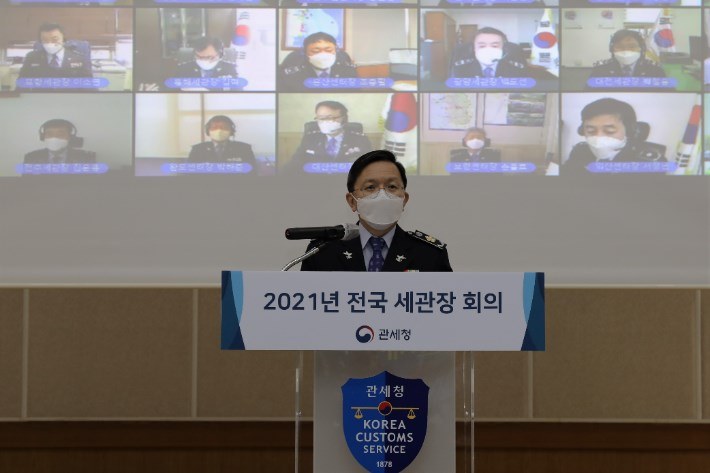Korea Customs Service supports emergency clearance for Covid-19 vaccine
Korea Customs Service is supporting 24 hours emergency customs clearance for vaccines and quarantine products, and strengthen the competitiveness of the bio, K food, and general manager (materials, parts, equipment) industries as regulatory innovations on new logistics processes.
In particular, they will establish the K-New Deal, New Growth Enterprises Export and Import Support Center' at national customs offices such as Seoul, Busan, Daegu, Incheon, etc., and focus on customs administration capabilities such as quick customs clearance, tax administration support, and using FTA preferential after discovering companies that are new to domestic demand and export related to specialized innovation industries by region.
Korea Customs Service is also planning to support Korean companies to utilize the complex FTA origin standards advantageously, and to expand the target of establishing an electronic exchange system for origin information to new southern countries such as Vietnam.
As part of the strengthening of economic border controls, they plan to expand inspection of imported goods by checking the site of each stage of import customs clearance and inspecting containers for refurbishment and surprise.
It was decided to block the import of radioactive and waste-infringing goods into the country and establish a wide-area investigation system and cope with the expansion of direct drug investigation.
As a balanced taxation administration, the government plans to expand the sharing of information on arrear of taxes with relevant ministries and agencies to concentrate its tariff investigation on high-cost and high-risk groups.
To prevent illegal and illegal trade, Korea Customs Service plans to protect K-Brands and Korean industries, and prevent dumping risks through cooperation with relevant ministries such as the National Tax Service and the Ministry of Trade and Industry.
For the digital innovation of customs administration, it has decided to redesign the IT infrastructure of the National Customs Comprehensive Information Network into a big data and cloud environment, and expand the field of application of the AI X-ray image reading system.
Commissioner Roh emphasized at the National Customs Heads' Meeting on February 4 that "Exports have become the main driving force for the rebound of our economy despite difficult conditions last year.", and added, “Again this year, let's put together the capabilities of all customs administrations for a quick and strong economic recovery.”
Meanwhile, to respond to the rapidly changing trade environment, Korean Customs Service is striving to achieve intelligence and efficiency in customs administration by incorporating new technologies of the 4th industrial revolution: big data, artificial intelligence (AI), and blockchain technology into customs administration.
Korea Customs Service held a National Customs Officer's Meeting at the Busan Headquarters on February 4 to announce a business plan for 2021 with such contents as the core.

Commissioner of Korea Customs Service, Roh Suk-Hwan was presenting a work plan at the 2021 National Customs Officers' Meeting held at the Busan Headquarters Customs on the afternoon of February 4th. (provided by Customs Office)
At the meeting, Korea Customs Service decided through a key project to promote the application of customs procedures before entering the port, quick confirmation of import requirements, abbreviation of customs inspection, etc. for 24-hour emergency customs clearance of vaccines and quarantine products.
It will also support small and medium-sized enterprises to enter the market by establishing a network dedicated to e-commerce and customs clearance, while transporting Chinese e-commerce goods from Korea to the airport without any cargo handling.
In particular, they will establish the K-New Deal, New Growth Enterprises Export and Import Support Center' at national customs offices such as Seoul, Busan, Daegu, Incheon, etc., and focus on customs administration capabilities such as quick customs clearance, tax administration support, and using FTA preferential after discovering companies that are new to domestic demand and export related to specialized innovation industries by region.
Korea Customs Service is also planning to support Korean companies to utilize the complex FTA origin standards advantageously, and to expand the target of establishing an electronic exchange system for origin information to new southern countries such as Vietnam.
As part of the strengthening of economic border controls, they plan to expand inspection of imported goods by checking the site of each stage of import customs clearance and inspecting containers for refurbishment and surprise.
It was decided to block the import of radioactive and waste-infringing goods into the country and establish a wide-area investigation system and cope with the expansion of direct drug investigation.
As a balanced taxation administration, the government plans to expand the sharing of information on arrear of taxes with relevant ministries and agencies to concentrate its tariff investigation on high-cost and high-risk groups.
To prevent illegal and illegal trade, Korea Customs Service plans to protect K-Brands and Korean industries, and prevent dumping risks through cooperation with relevant ministries such as the National Tax Service and the Ministry of Trade and Industry.
For the digital innovation of customs administration, it has decided to redesign the IT infrastructure of the National Customs Comprehensive Information Network into a big data and cloud environment, and expand the field of application of the AI X-ray image reading system.
Commissioner Roh emphasized at the National Customs Heads' Meeting on February 4 that "Exports have become the main driving force for the rebound of our economy despite difficult conditions last year.", and added, “Again this year, let's put together the capabilities of all customs administrations for a quick and strong economic recovery.”
Meanwhile, to respond to the rapidly changing trade environment, Korean Customs Service is striving to achieve intelligence and efficiency in customs administration by incorporating new technologies of the 4th industrial revolution: big data, artificial intelligence (AI), and blockchain technology into customs administration.

Leave your comment on this story